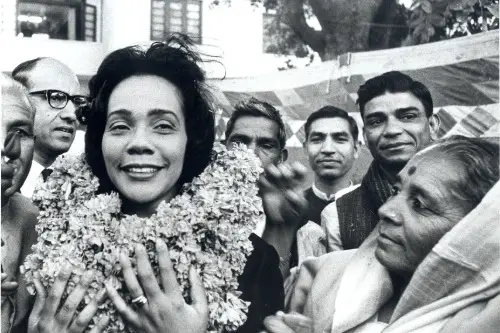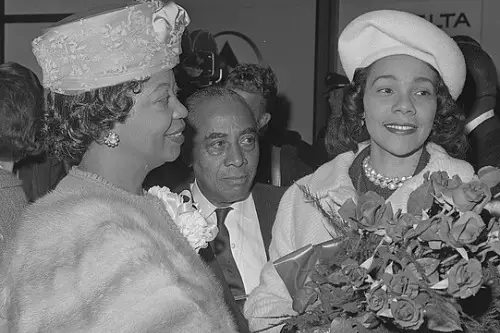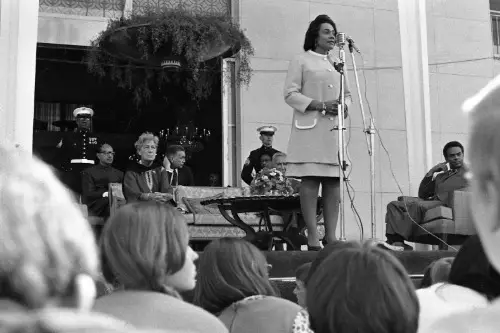Coretta Scott King is a name that resonates with courage, resilience, and quiet power. Often overshadowed by the larger-than-life legacy of her husband, Dr. Martin Luther King Jr., Coretta’s own contributions to the Civil Rights Movement and beyond are often overlooked. But it is precisely in her quiet strength, her ability to persevere and stand firm in the face of overwhelming odds, that her true greatness lies. In this blog, we’ll explore the life of Coretta Scott King, not just as the wife of a famous leader, but as a woman who carved out her own path and made an indelible impact on the world.
A Woman of Vision and Purpose

Coretta Scott King was born on April 27, 1927, in Heiberger, Alabama, the youngest of three children in a hardworking, close-knit family. Raised in a segregated South, she experienced firsthand the crushing limitations of racism. However, Coretta’s parents, Obadiah and Bernice Scott, were determined that their children would receive an education and have opportunities beyond the narrow confines of their time. Coretta excelled in school, becoming the valedictorian of her high school class, and went on to attend Antioch College in Ohio, where she would meet Martin Luther King Jr. It was there that she began to lay the foundation for her future work, studying music and education, two passions that would continue to shape her activism throughout her life.
But Coretta was more than just a student. She was a visionary. While attending Antioch College, she not only excelled academically but also became deeply involved in the fight for racial justice. This was the time when the seeds of the Civil Rights Movement were beginning to take root, and Coretta felt a deep calling to be part of something larger than herself. This sense of purpose led her to move to Boston to attend the New England Conservatory of Music, where she earned a degree in voice and music education. During this time, she also became involved in social justice work, marching for equal rights and speaking out against injustice.
It was in Boston that Coretta met Martin Luther King Jr., and their shared passion for justice, equality, and peace quickly bonded them. They married in 1953, and soon after, the couple moved to Montgomery, Alabama, where Martin became the leader of the Montgomery Bus Boycott. Coretta’s role, while often unsung, was pivotal in these early years. She was not just the wife of a prominent leader; she was a partner in the struggle. She raised her children, supported her husband, and played an instrumental role in the growing movement for civil rights.
The Silent Strength of Coretta Scott King

While Martin Luther King Jr. stood at the forefront of the Civil Rights Movement, delivering impassioned speeches and leading marches, Coretta Scott King quietly stood beside him as his emotional and intellectual equal. What made Coretta’s strength truly silent was her ability to support her husband without the public spotlight shining on her as it did on him. She was there through every trial, every triumph, and every tragedy. But Coretta was much more than a supportive wife; she was a leader in her own right.
In the years following the Montgomery Bus Boycott, Coretta’s life was marked by both profound love and immense pain. She was a mother to four young children, yet she stood with Martin at the helm of a movement that often brought violence, threats, and heartbreak. Coretta was never far from the action, attending rallies, organizing meetings, and speaking out for justice. Even after the bombing of the King family home in 1956, Coretta never faltered in her commitment to the cause. Instead, she became even more resolute in her belief that nonviolent resistance was the key to overcoming the systemic injustice that plagued the nation.
What many people don’t realize is the incredible strength Coretta displayed during this time. The threat of violence was constant, and she was often left to care for her children while her husband faced countless risks to his life. In fact, after Martin’s death, Coretta would reflect on the toll this violence had taken on her, but she always spoke about it with quiet dignity. She carried the heavy burden of grief, but never allowed it to overshadow the importance of the work that had to continue.
Coretta’s strength was also seen in the way she maintained her family’s legacy. After Martin Luther King Jr.’s assassination in 1968, Coretta became the unwavering protector of his vision. Instead of retreating into grief, she stepped forward and worked tirelessly to honor his memory, ensuring that his ideas about equality, justice, and peace were not forgotten. She pushed for the creation of a national holiday in his honor, and eventually, in 1983, President Ronald Reagan signed into law the observance of Martin Luther King Jr. Day, thanks in no small part to Coretta’s efforts.
Coretta’s Legacy: A Leader in Her Own Right

In the decades after Martin’s death, Coretta Scott King’s work continued to expand, and her role in the fight for civil rights and social justice became even more profound. She was more than just the widow of a great man; she was a force in her own right. She founded the Martin Luther King Jr. Center for Nonviolent Social Change in Atlanta, Georgia, which became a hub for education, activism, and preserving the King legacy. She also continued to advocate for women’s rights, LGBTQ+ rights, and global peace, making it clear that the struggle for justice did not end with the Civil Rights Movement.
Coretta’s role as a mother was also essential in shaping the lives of her children. She encouraged them to follow their own passions, but she also instilled in them the values of love, justice, and equality. Her children grew up with the knowledge that they were part of something much larger than themselves, and they, too, became involved in activism and public service, continuing the work that their parents had started.
Perhaps one of the most significant aspects of Coretta’s legacy is her ability to bridge the gaps between generations and cultures. She worked tirelessly to ensure that Dr. King’s message of nonviolence and love would resonate across the globe. She traveled the world, meeting with world leaders, advocating for peace, and spreading her husband’s message. But she also worked within the United States to address the pressing issues of the time, including poverty, racism, and the Vietnam War. In every sense, Coretta Scott King was a global ambassador for peace and justice, much like her husband.
Her influence was not just political or social; it was deeply spiritual. Coretta’s faith and commitment to nonviolence were central to her work, and she always believed that change could be achieved through love and understanding, not through violence and division. This philosophy guided her through the darkest of times, and it continues to inspire generations of activists and leaders today.
